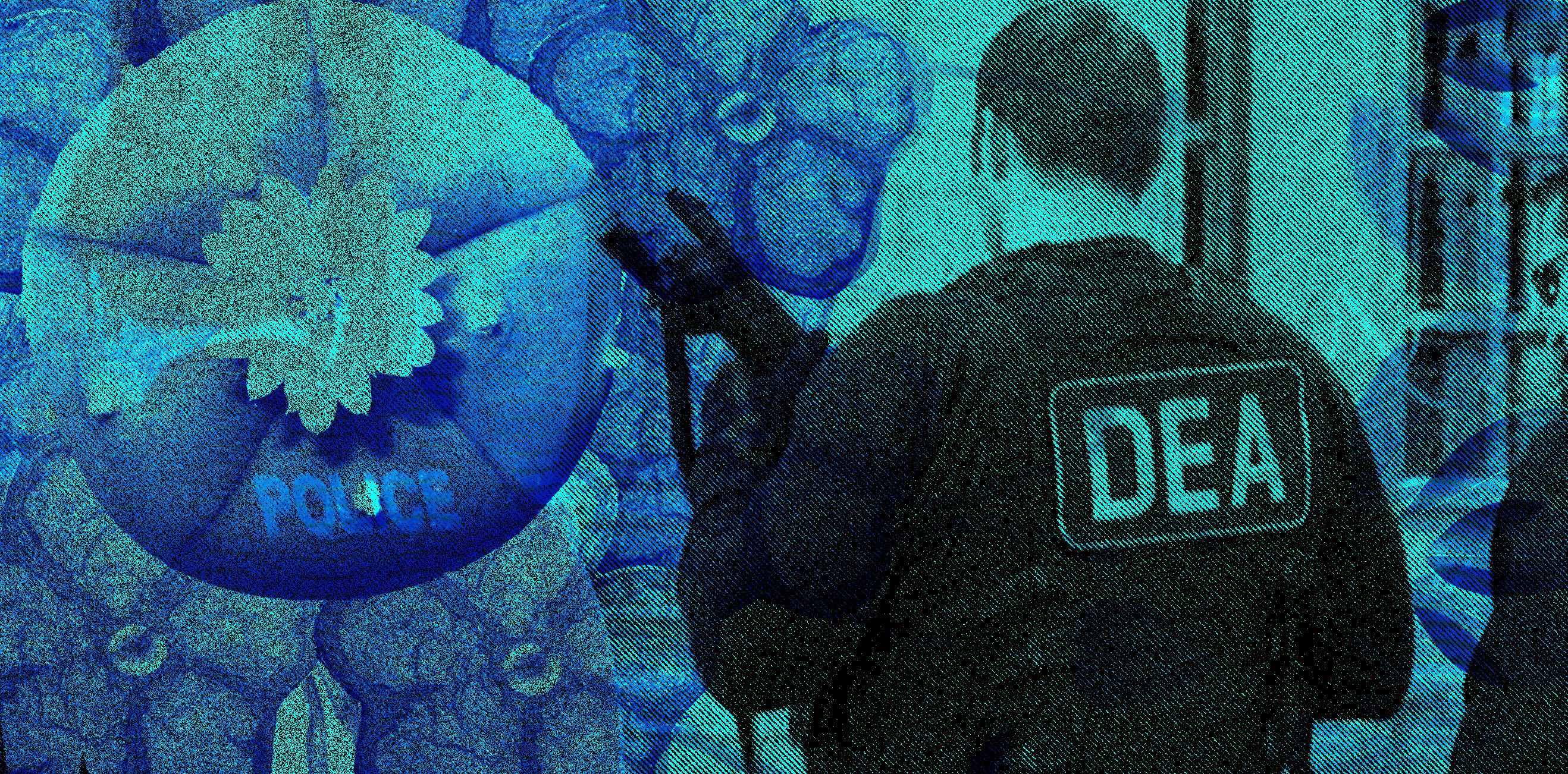- DEA and the Religious Exemption: A Fox Guarding the Henhouse - October 13, 2020
There are hundreds of groups using ayahuasca in ceremonial underground contexts in the United States. They all dream of future legalization and the ability to use ayahuasca as a religious sacrament without fear of criminal prosecution.
There are hundreds of groups using ayahuasca in ceremonial underground contexts in the United States. They all dream of future legalization and the ability to use ayahuasca as a religious sacrament without fear of criminal prosecution. In this piece, I discuss the current legal mechanisms that the U.S. Government has in place for such situations; a rather complicated scenario that, as currently constituted, seemingly disfavors religious free exercise.
Since the Supreme Court’s decision in Gonzales v. O Centro Espirita Beneficente União do Vegetal (“O Centro”)[1] was handed down in 2006, the U.S. Drug Enforcement Administration (or DEA) has attempted to control constitutionally protected religious exercise involving prohibited controlled substances, including religious use of ayahuasca, using a petitioning and registration process. Specifically, the DEA has established a process for religious adherents to petition the administration for an exemption to criminal prohibitions on the use of controlled substances established by the Comprehensive Drug Abuse Prevention and Control Act, also known as the Controlled Substances Act (or CSA).
The DEA’s petitioning and registration procedures are derived exclusively from a document entitled Guidance Regarding Petitions for Religious Exemption from the Controlled Substances Act Pursuant to the Religious Freedom Restoration Act (hereinafter, DEA RFRA Guidance). And, while labeled by the DEA as merely a “guidance,” the DEA RFRA Guidance does far more than simply guide religious adherents in use of prohibited controlled substances in the exercise of religious activities.
The DEA RFRA Guidance sets forward comprehensive procedural and substantive requirements not found in any federal statute or administration regulation. Specifically, the DEA RFRA Guidance:
- Establishes a comprehensive petitioning process for religious practitioners seeking exemption from the CSA’s prohibitions on use of controlled substances, and in particular, naturally-occurring Schedule I controlled substances, including DMT, mescaline, peyote, psilocybin, psilocin, ibogaine, and marijuana;
- Argues that DEA regulations governing registration of persons undertaking medical, scientific, research, and industrial activities related to controlled substances apply to religious exercise using controlled substances; and,
- Prohibits the free exercise of religion involving a controlled substance until such time as the DEA has issued a “certificate of registration” and without providing a time-frame for rendering a final administration decision once a religious adherent initiates the administration petitioning process.[2]
Further, the DEA RFRA Guidance presupposes that the administration petitioning process is a legal requirement, and that theadministration regulations governing registration of manufacturers, distributors, and dispensers of controlled substances apply to religious adherents; neither of which is accurate.
With the DEA RFRA Guidance, the DEA has established a lengthy and often costly process that, from the outside, does not appear to have resulted in a single exemption issued to any religious adherent or entity from criminal prohibitions on the use of controlled substances for purposes of the free exercise of religion guaranteed by the First Amendment to the U.S. Constitution.
With the DEA RFRA Guidance, the DEA has established a lengthy and often costly process that, from the outside, does not appear to have resulted in a single exemption issued to any religious adherent or entity from criminal prohibitions on the use of controlled substances for purposes of the free exercise of religion guaranteed by the First Amendment to the U.S. Constitution.[3]
For the reasons set forward in this article, the DEA RFRA Guidance should be treated as non-binding and without the independent force and effect of law. Further, the non-binding, unenforceable nature of the DEA RFRA Guidance should be taken into consideration as religious adherents evaluate whether to engage in the DEA’s petitioning process and seek a certificate of registration from the DEA or take matters directly to court and bring legal challenges authorized by the Religious Freedom Restoration Act.
As the DEA RFRA Guidance was contemplated to only be an “interim measure,” this article suggests that the administration would be better served by undertaking formal rulemaking procedures for establishing a new class of registrants for religious activities and creating a registration process that focuses less on the DEA evaluating whether a person’s or entity’s religious exercise is sincere, and more on the administration law enforcement duties in preventing diversion from registered religious adherents to illicit and recreational markets.
The DEA RFRA Guidance is Non-Binding and Unenforceable
The DEA RFRA Guidance in non-binding and unenforceable. The provisions in the guidance requiring petitioning and DEA registration do not have the force and effect of law either independently or by reference.
In Western Radio Servs. Co. v. Espy,[4] the Ninth Circuit Court of Appeals established a two-part test for determining whether administration guidance documents have the independent force and effect of law. Specifically, the administration pronouncement must (1) prescribe substantive rules—not interpretive rules, general states of policy or rules of administration organization, procedure or practice; and, (2) conform to certain procedural requirements. To satisfy the first requirement the rule must be legislative in nature, affecting individual rights and obligations; to satisfy the second, it must have been promulgated pursuant to a specific grant of authority and in conformance with the procedural requirements imposed by Congress.[5]
While the DEA RFRA Guidance does prescribe substantive rules, it was not promulgated in accordance with the procedural requirements of the Administrative Procedures Act (APA), and therefore does not rise to the status of a binding administration regulation or law.

First, the DEA RFRA Guidance admittedly prescribes substantive rules for seeking an exemption from the CSA and mandates that religious adherents first obtain a “certificate of registration” from DEA prior to engaging in any activity “prohibited under the Controlled Substances Act or its regulations.”[6] The DEA’s petitioning process requires submission of “both a written statement and supporting documents” demonstrating how the application of the CSA to the religious adherent’s activity would “(1) be a substantial burden on (2) his/her sincere (3) religious exercise.”[7] Further, the DEA RFRA Guidance argues that religious adherents are “bound by all applicable laws and Controlled Substances Act regulations” governing registration of persons undertaking medical, scientific, research, and industrial activities related to Schedule I substances.[8]
However, none of the administration petitioning and registration requirements are mandated or even suggested by an act of Congress or administration regulation. Neither the CSA nor the Religious Freedom Restoration Act (RFRA) establish an administration petitioning process for religious adherents seeking a religious exemption from the CSA for activities involving controlled substances. Instead, RFRA specifically authorizes persons whose religious exercise has been burdened by the CSA to “assert that violation as claim or defense in a judicial proceeding and obtain appropriate relief against the government.”[9]
Further, while registration is required under the CSA for persons who manufacture, distribute, dispense, and import or export controlled substances, registration is only authorized for “legitimate medical, scientific, research and industrial purposes”[10] — which DEA regulations classify as “business activity.”[11] There is no allowance for a “certificate of registration” from the DEA for constitutionally protected religious exercise, which is not contemplated as a registered activity under the CSA and administration regulations. In other words, the DEA RFRA Guidance establishes a new, substantive requirement for DEA registration for religious exercise where none currently exists under Federal law.[12]
Second, the DEA RFRA Guidance was not promulgated in accordance with the procedural requirements of the APA. The guidance was not published in the Federal Register, is not found in the Code of Federal Regulations, and is not contemplated in a congressional statute.[13] Importantly, despite the substantive requirements of the guidance requiring petitioning and registration, the DEA RFRA Guidance was not subjected to public notice and comment rulemaking procedures of the APA; a perquisite for establishing enforceable administration regulations.[14] As such, the DEA RFRA Guidance fails the second prong of the Ninth Circuit’s two-part test, and does not have the independent force and effect of law.
As such, the DEA RFRA Guidance is non-binding and unenforceable.
In sum, despite the fact that the DEA RFRA Guidance prescribes substantive requirements for religious adherents to seek exemption from the CSA for religious exercise involving controlled substances, the guidance was not promulgated pursuant to a specific grant of authority and in conformance with the procedural requirements imposed by Congress. As such, the DEA RFRA Guidance is non-binding and unenforceable.
DEA Rulemaking and Diversion Prevention
the administration should consider undertaking formal rulemaking procedures under the APA for establishing a new class of registrants for religious activities, and the creation of a registration process that focuses less on the DEA evaluating whether a person’s or entity’s religious exercise is sincere, and more on the administration law enforcement duties in preventing diversion from registered religious adherents into illicit and recreational markets.
Because the DEA RFRA Guidance is unenforceable, and in light of the DEA’s contention that religious adherents first obtain a “certificate of registration” before religious exercise involving controlled substances, the administration should consider undertaking formal rulemaking procedures under the APA for establishing a new class of registrants for religious activities, and the creation of a registration process that focuses less on the DEA evaluating whether a person’s or entity’s religious exercise is sincere, and more on the administration law enforcement duties in preventing diversion from registered religious adherents into illicit and recreational markets.
By focusing primarily on development of uniform regulations for registration for religious activities involving controlled substances, the DEA can establish meaningful guardrails against diversion of controlled substances from any registered religious exercise or activity. Controls on diversion could include such things as:
- Limiting consumption to a particular location and/or religious congregation;
- Banning use of firearms;
- Requiring adequate security and track and trace measures;
- Implementing reporting requirements;
- Preventing diversion to minors;
- Preventing drugged driving; and/or,
- Preventing trafficking or other illegal activity.
Unlike assessing the sincerity of religious exercise, these activities traditionally fall within the DEA’s organic statute, the CSA.
Underscoring this point, former U.S. Attorney General Jeff Sessions recently stated in a memo to all executive departments and agencies that,
[The Religious Freedom Restoration Act] applies to all sincerely held religious beliefs, whether or not central to, or mandated by, a particular religious organization or tradition. Religious adherents will often be required to draw lines in the application of their religious beliefs, and government is not competent to assess the reasonableness of such lines drawn, nor would it be appropriate for government to do so. Thus, for example, a government administration may not second-guess the determination of a factory worker that, consistent with his religious precepts, he can work on a line producing steel that might someday make its way into armaments but cannot work on a line producing the armaments themselves. Nor may the Department of Health and Human Services second-guess the determination of a religious employer that providing contraceptive coverage to its employees would make the employer complicit in wrongdoing in violation of the organization’s religious precepts.[15]
For this reason, the DEA would be best served focusing on crafting meaningful allowances for the free exercise of religion involving controlled substances while developing controls for preventing diversion to illicit and recreational markets.
As applied to religious exercise involving controlled substances, the Sessions’ memo states that it is inappropriate for the DEA to second-guess an adherents’ sincere religious exercise involving controlled substances. For this reason, the DEA would be best served focusing on crafting meaningful allowances for the free exercise of religion involving controlled substances while developing controls for preventing diversion to illicit and recreational markets.
Finally, after all is said, religious activity is not one of the “legitimate purposes” identified by Congress for registration under the CSA[16] and an act of Congress, and not simply promulgation of administration regulations, ultimately may be required to allow the DEA to register religious adherents for the use of prohibited controlled substances.
Art by Karina Alvarez.
Footnotes
[1] 546 U.S. 418 (2006). In O Centro, the Court held that the U.S. Government failed to demonstrate a compelling interest in barring O Centro Espirita Beneficente União do Vegetal’s (or UDV’s) sacramental use of hoasca, a tea made from two plants that contain dimethyltryptamine (DMT), a Schedule I controlled substance under the CSA. Hoasca is synonymous with ayahuasca.
[2] See DEA RFRA Guidance, para. 2, 6, 7.
[3] The free exercise of religion is a right guaranteed by the First Amendment to the U.S. Constitution, which provides that, “Congress shall make no law respecting an establishment of religion, or prohibiting the free exercise thereof…”
[4] 79 F.3d 896 (9th Circ. 1995) (“Western Radio Servs. Co.”).
[5] Western Radio Servs. Co., 79 F.3d at 901 (quoting, U.S. v. Fifty-Three Eclectus Parrots, 685 F.2d 1131, 1136 (9th Cir. 1982) (emphasis in bold added).
[6] See DEA RFRA Guidance, ¶¶2, 6, 7.
[7] See DEA RFRA Guidance, ¶2.
[8] SeeDEA RFRA Guidance, ¶6.
[9] 42 U.S.C. §2000bb–1(c) (emphasis supplied).
[10] See21 U.S.C. §823(a)(1), (b)(1).
[11] See, e.g.,21 C.F.R. §1301.13(e)(1).
[12] Additionally, the DEA mandates that all religious exercise involving controlled substances cease until such time as a certificate of registration has been granted by the administration. This prior restraint on the free exercise of religion involving controlled substances is an additional, substantive legal requirement mandated by the administration.
[13] Western Radio Servs. Co., 79 F.3d at 901. While the Religious Freedom Restoration Act (RFRA) restores the compelling governmental interest test to “all Federal law, and the implementation of that law” that substantially burden sincerely held religious exercise, RFRA does not establish administrative exhaustion requirements, or create administrative remedies or administration appeal rights, only judicial ones. See 42 U.S. Code §§ 2000bb–1(c) and 2000bb–3(a).
[14] Western Radio Servs. Co., 79 F.3d at 901.
[15] Federal Law Protections for Religious Liberty, U.S. Attorney General Jeff Sessions, October 6, 2017 (emphasis supplied) at 4.
[16] See 21 U.S.C. §823(a)(1), (b)(1).
Take a minute to browse our stock:
Did you enjoy reading this article?
Please support Chacruna's work by donating to us. We are an independent organization and we offer free education and advocacy for psychedelic plant medicines. We are a team of dedicated volunteers!
Can you help Chacruna advance cultural understanding around these substances?
















